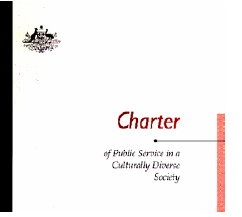The Charter of Public Service in a Culturally Diverse Society, Australian Government
The Charter of Public Service in a Culturally Diverse Society was initially developed when Bill Cope was Director of the Office of Multicultural Affairs in the Department of the Prime Minister and Cabinet of the Australian Government. Following is a rationale for the Charter and the Charter principles. Following is an example of a set of principles created for government which recognises the necessity of civic pluralism.

Service organisations, both public and private, have traditionally regarded their clienteles as generic, and their services as universally applicable. Recently, however, service values have moved in the direction of customisation, niche marketing and services that are relevant and appropriate to different groups of clients. These newer approaches to customer service are clearly more sensitive to diversity than the older, generic or ‘mass’ approaches.
Not only has this shift in approach become essential in contexts where clients come from culturally and linguistically diverse backgrounds. It has also become the foundation upon which to improve effectiveness and efficiency. To take positive potentials of this approach in the case of the public sector, effectiveness is a matter of providing good service to every customer and ensuring that government serves all citizens. Efficiency is a matter of making sure that resources are properly used: providing the right service, the right way the first time to meet the precise needs of each and every client …
The new public sector orientation towards the development of Departmental strategic plans and service charters represents both an opportunity and a potential danger. The danger is that Departments will conceive their clientele in generic and universal terms, thereby establishing frameworks in which their service provision may prove to be irrelevant or inappropriate to many Australians. There is also an exciting opportunity to develop an ethos of public service that is genuinely universal and inclusive precisely because, paradoxically, that service is sensitive to client differences and customised accordingly in order to meet those varied needs most effectively …
It is now time to reconsider the best way to introduce a universal orientation to the public service that interprets the universal as always marked by differences, be they about geographic location, gender, language proficiency, cultural familiarity with public services, ethnicity, indigenous status, age, and so on.
There is no need, in other words, for there to be a polarity between universal services ‘for all Australians’, on the one hand, and arrangements for distinctive needs of groups such as immigrants and Aborigines or Torres Strait Islanders on the other. Rather, public sector agencies need to develop a framework that builds these groups naturally and inclusively into the core business of government. Mainstream management systems and client service processes must themselves be based on flexibility and adaptation as the fundamental basis of effectiveness and efficiency.
The Seven Charter Principles
- Access: Government services should be available to everyone who is entitled to them, regardless of where they live, and should be free of any form of discrimination on the basis of birthplace, language, culture, race or religion.
- Equity: Government services should be delivered on the basis of fair treatment of clients who are eligible to receive them.
- Communication: Government service providers should use strategies to inform eligible clients of services and their entitlements, and how they can obtain them. Providers should also consult with the community regularly about the adequacy, design and standard of government services.
- Responsiveness: Government services should be sensitive to the needs and requirements of different communities, and responsive to the particular circumstances of individuals.
- Effectiveness: Government service providers must be ‘results oriented’, focused on meeting the needs of clients from all backgrounds.
- Efficiency: Government service providers should optimise the use of available public resources through a user-responsive approach to service delivery which meets the needs of clients.
- Accountability: Government service providers should have a reporting mechanism in place which ensures they are accountable for implementing Charter objectives for clients.
Department of Immigration and Multicultural Affairs. 1998. ‘Charter of Public Service in a Culturally Diverse Society.’ Canberra: DIMA.
